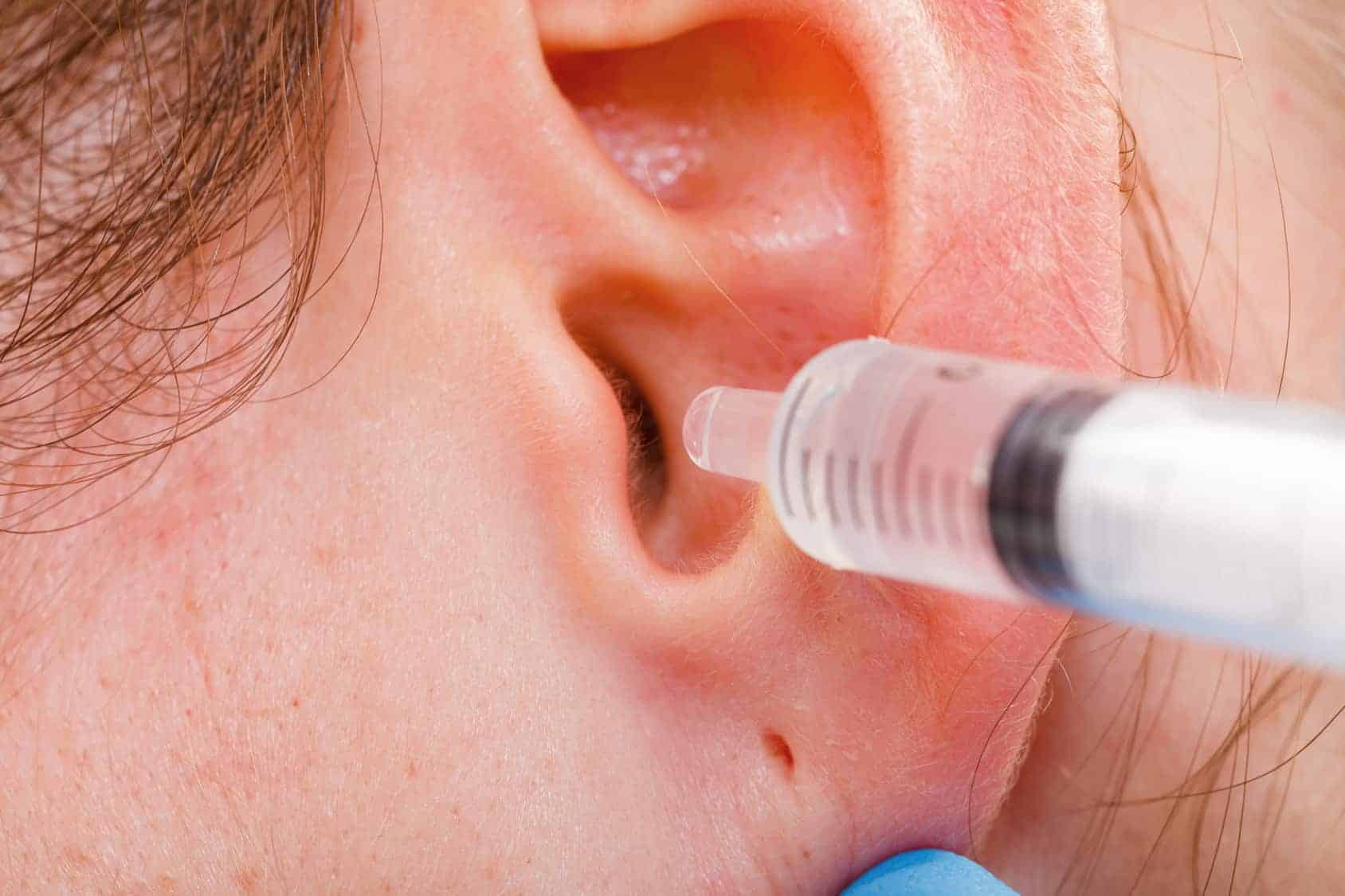Earwax is bothersome, and ear infections can be a painful experience and one that you would hope to eliminate from your future health concerns.
Fortunately, some people have had great success with a home remedy with only two natural, safe ingredients that can help reduce the likelihood of ear infections and also remove ear wax buildup.
You most likely already have these two ingredients in your home, so there is no need to go out and buy anything. You’ll probably find these two products in your bathroom and kitchen. Here’s a simple home remedy with only two ingredients that can eliminate earwax buildup and prevent ear infections.
These Two Ingredients Can Eliminate Earwax and Ear Infections
Mix equal parts of white vinegar and rubbing alcohol together for our ear health recipe. Start with a small amount, about a teaspoon of each. Mix them in a small bowl or measuring cup. You can make a more considerable amount and store it for next time, but try it first to see how it works for you.
After mixing these two ingredients, use a clean eyedropper to put about half of the mixture into one ear while you tilt your head to the side. Keep your head tilted and allow the mixture to sit in your ear for one minute. After a minute, tilt your head over the sink to enable the solution to drip out.
Repeat the process with the other half of the healthy ear mixture in your other ear, and again allow it to sit in your ear for one minute. Then tilt your head and drain it out.
Audiologist Dr. Robert L. Martin says that alcohol can dry out the ear, which can cause the skin to crack and bleed. This treatment should be used for those who need to dry out an ear exposed to moisture, not those in a dry environment.
Dr. Martin suggests this treatment twice a day for four days when you know that your ears have been exposed to moisture, for example, after swimming. The ear health remedy can be used twice a week for several months if you have chronically moist ears or are exposed to high humidity.
Earwax prevention
This prevention tool is highly recommended for those who frequently suffer from swimmer’s ear problems or sinus infections that can spread to the ear. The remedy should be used before issues occur, not on an already infected ear.
Conditions that make ear infections more likely include:
- Higher outside temperatures
- Higher humidity
- Exposure to moisture for long periods
Swimmers, those who often get water in their ears during showers or baths, and people who live in hot, humid climates are more likely to develop infections. These warm, moist environments are breeding grounds for fungi and bacteria.
As much as possible, keep your ears dry inside by wearing earplugs when swimming, snorkeling, or scuba diving. Avoid tilting your head to let the shower water run into your ear. If water does get into your ear, dry the outer ear with a towel, tilt your head to allow the water to drain out, and carefully use a cotton swab to absorb additional moisture.
Symptoms of an ear infection
Both bacteria and fungus can live in a moist ear. Either of these microbes can be responsible for the pain of an earache and infection. If these symptoms are present, see a medical professional rather than using the vinegar and alcohol treatment. Again, the two-ingredient remedy is meant to prevent ear problems, not treat them. Signs of ear infection include:
- Itching
- Pain
- Tenderness
- Hearing loss
- A plugged ear feeling
- A feeling of the ear having fluid in it
Earwax problems
A buildup of wax inside the ear should not happen naturally because the ear is naturally self-cleaning. To clean the ear, we push earwax into the ear canal with a cotton swab rather than removing it. Symptoms of an earwax buildup are similar to those of infection and include the following:
- Dizziness
- Ringing in the ear
- Itching
- Drainage
- Decreased hearing
- A feeling of a plugged ear
- Itchiness
- Pain
Healthy ears
Dr. Martin says that the natural ear is self-cleaning, so we should never wash inside the ear canal with soap or water. He says that ear wax is not something you can dissolve with water anyway, so cleaning with water will not be effective.
The symptoms of an ear infection and earwax buildup are similar, so don’t diagnose yourself. If you are experiencing symptoms, it is probably too late for the ear problem prevention recipe.
Protect your hearing and consult with an audiologist or otolaryngologist (an ear, nose, and throat doctor) at the first sign of a problem.
Conventional medicine may need to provide a cure before you can use vinegar and alcohol on your ears. To prevent future ear health problems, earplugs can be used for swimmers to keep the ear canal dry.
Besides Removing Earwax, Try These 8 Other Ways to Improve Ear Health

Now that you have one solution to try, what else might help improve your ear health?
1. Wear earplugs when exposed to loud sounds.
According to a report by the National Institute on Deafness and Other Communication Disorders (NIDCD), about 24% of adults aged 20-69 suffer from some degree of noise-induced hearing loss. Those who had on-the-job exposure to loud noise had a higher likelihood of developing audiometric notches. These notches appear in the ears due to prolonged exposure to loud sounds. The report found that loud sounds in the workplace increased the likelihood of “noise” notches in the ears by 2X.
Loud sounds may include chainsaws, lawnmowers, and other types of heavy machinery. Music at clubs and concerts can also induce hearing loss over time. To prevent this, invest in quality earplugs, such as musicians’ earplugs, when exposed to noisy environments. These earplugs have filters that allow a person to hear conversations but reduce dangerous sound levels. If you work in a factory or other industrial site, your company will probably provide or recommend special industrial earplugs.
2. Turn your volume down when using headphones.
According to the World Health Organization, over 1 billion people worldwide risk noise-induced hearing loss from booming music and other recreational sounds. When listening to music on personal audio devices, avoid using earbuds next to the eardrum. Instead, wear headphones that fit over the ears to reduce your noise exposure. Also, the WHO recommends keeping the volume level below 85 decibels for safe listening.
For safe listening at concerts and other venues, they also set these guidelines for implementation:
- a maximum average sound level of 100 decibels;
- live monitoring and recording of sound levels using calibrated equipment by designated staff;
- optimizing venue acoustics and sound systems to ensure enjoyable sound quality and safe listening;
- making personal hearing protection available to audiences, including instructions on use;
- access to quiet zones for people to rest their ears and decrease the risk of hearing damage; and
- provision of training and information to staff.
3. Exercise frequently.
Exercise benefits every part of your mind and body, including the ears. During a workout, blood flow to the ear increases. This helps the tiny hair cells in the inner ear translate sound into signals, which get transmitted to your brain. Since the hairs don’t regrow, it can lead to permanent hearing loss if the hair cells get damaged. So, in addition to keeping the volume down on your earphones, it’s also essential to engage in regular exercise. This will improve your hearing since you’ll have increased blood flow and, therefore, oxygen to keep the ears working optimally.
Also, the increased blood flow will keep blood pressure down, a primary driver of hearing loss.
4. Manage stress levels.
According to a 2018 study, otologic symptoms such as dizziness and tinnitus have been linked to emotional stress. Prolonged stress can therefore make tinnitus worse. Researchers believe tinnitus acts as a warning sign when reacting to an external stressor. Your body then goes into fight-or-flight mode, a survival instinct that increases adrenaline and cortisol in the body.
Experts believe that when the blood flow travels into your inner ear, it can lead to tinnitus symptoms.
5. Get regular checkups.
When you go for a doctor’s visit, ask him or her to perform a hearing screening just in case. Hearing loss doesn’t happen immediately, so many people can go years without noticing the difference. That’s why it’s essential to have annual hearing screenings so that doctors can alert you to the warning signs of early hearing loss. Additionally, consider asking about ear care services, such as Ear Wax Removal Sutton Coldfield, to ensure your ears are in optimal condition.
Untreated hearing loss reduces the quality of life and can even cause depression, dementia, and heart disease.
6. Stop smoking.
According to research from the University of Manchester in the UK, smoking increases the risk of hearing loss by 28%. The risk for hearing loss was even more pronounced in those who smoked more often. Experts believe smoking contributes to hearing loss because of chemicals in cigarettes that constrict blood vessels. This prevents oxygen from traveling to your inner ear and keeps hair cells in the cochlea functioning correctly. In addition, nicotine can disrupt neurotransmitters in the auditory nerve, causing them to mishear sounds.
7. Take medications only as needed.
Certain medications, such as aspirin, NSAIDs, or acetaminophen, can sometimes result in hearing loss. Make sure to take these medications when needed, and avoid taking them daily for prolonged periods.
8. Wear hearing aids if necessary.
If you’ve been prescribed hearing aids to help with hearing loss, it’s vital to wear them during waking hours. The hearing aids work by amplifying sound and converting it to a digital signal, which travels into the ear. Then, it makes its way into the brain’s auditory region, which processes it into audible sound. Untreated hearing loss can cause this part of the brain to shrink from lack of use, making hearing nearly impossible.
Hearing aids improve your health in other ways as well. A 2019 study examined the positive effects of hearing aids in participants’ first three years of wearing them. In people with newly-diagnosed hearing loss, hearing aids reduced dementia risk, fall-related injuries, and anxiety or depression by 18, 13, and 11 percentage points, respectively.
Final Thoughts on Preventing Earwax and Ear Infections
Luckily, preventing earwax and ear infections requires only two ingredients that you probably already have at home. A mixture of white vinegar and rubbing alcohol can help remove moisture from the ears, especially after swimming. Using this treatment twice per day for four days reduces the risk of developing infections or earwax buildup.
Of course, the ears clean themselves naturally, so you should only use the treatment after swimming or for sinus infections. Other ways to keep the ears healthy include regular checkups, exercising, managing stress, and keeping the volume down on audio devices. In addition, make sure to avoid smoking or taking aspirin frequently, as both have been linked to hearing loss.




















